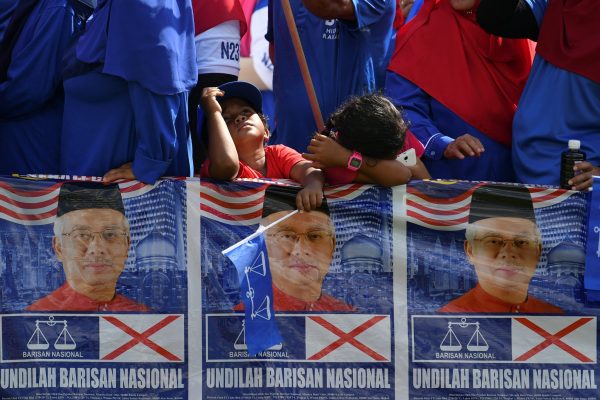Much of that electoral success over the past 61 years has been down to a strong record of economic development combined with a skilful — if cynical — deployment of ethnic and religious politics. As the years have gone on, however, regular BN victories have grown more and more dependent on the government’s rigging the electoral game in its favour.
Successive BN governments have taken advantage of a politicised Election Commission to concoct malapportioned and gerrymandered electoral districts in Malaysia’s 222-seat Parliament. Thanks both to the Election Commission and to Malaysia’s first-past-the-post electoral system, it’s theoretically possible to win a parliamentary majority in Malaysia with only a fifth or so of the popular vote. Indeed, in Najib’s first election as prime minister in 2013, BN lost the popular vote but was re-elected with a large parliamentary majority.
Malaysia is not the only country where elections deliver unfair outcomes. The unrepresentativeness of electoral systems in Britain and Canada until quite recently (and in Japan to this day) is well-known. In 2016 the United States’ Electoral College delivered the presidency to the candidate who lost the popular vote by millions of votes.
But the flaws of Malaysia’s system are of another scale entirely. They reflect a sustained and deliberate effort to skew elections in favour of the BN, writes Clive Kessler in this week’s lead article. That’s why a BN victory on 9 May would not necessarily reflect a vote of confidence in Najib’s leadership nor in the competence of his government.
As Kessler writes, malapportionment has an effect far beyond simple matters of parliamentary arithmetic. It profoundly shapes the character of political discourse and ideological competition. Malaysia is a famously multiethnic, multireligious nation, yet ‘[t]he Election Commission’s constituency delineation ingenuity constructs a “voting nation” that, through the vastly unequal weight given to rural over urban electorates, is far more hardline pro-Malay and pro-UMNO than the nation as a whole and its citizens’.
This is undoubtedly the logic behind the Pakatan Harapan opposition coalition’s naming former UMNO prime minister Mahathir Mohamad as its candidate for prime minister. The choice of a 93-year-old authoritarian ex-leader as a symbol of political renewal seems an odd one; indeed, Mahathir’s 22-year rule saw the degeneration of Malaysia’s public institutions and the flourishing of crony capitalism.
But in the context of the electoral distortions Kessler outlines, having Mahathir lead the charge against Najib makes some sort of sense. The opposition is banking on the pull of nostalgia for the Mahathir era to make it competitive in the Malay heartland, where voters are growing impatient with government corruption and policy missteps.
In her pre-election analysis, however, Bridget Welsh highlights that elsewhere the picture is more complicated. ‘The opposition’, she writes, ‘is struggling with how to distance itself from Mahathir’s divisive political legacy, especially in East Malaysia where he remains unpopular’. Which way seats fall in the Borneo states of Sabah and Sarawak, where a desire for autonomy is seeing voters turn away from local BN affiliate parties, is one of the ‘wild cards’ in GE14 that pundits are watching closely.
For Najib there is a lot at stake personally. His leadership of UMNO will come under threat if he doesn’t deliver a convincing result, and because of this ‘the election is seen as so personalised that he cannot lose’, writes Welsh. In the background lies the ongoing 1Malaysia Development Berhad (1MDB) scandal. The United States Department of Justice has stated that a ‘senior official of the Malaysian government’ — later identified as Najib — received US$681 million in funds misappropriated from 1MDB into his personal bank account. The US Federal Bureau of Investigation’s criminal investigation into the handling of 1MDB monies continues. It’s not surprising, then, that Najib’s government has resorted to petty tricks to swing the election its way, such as scheduling the election on a Wednesday as well as more sinister moves like passing a broadly-worded anti-‘fake news’ law and expanded emergency powers.
As Kessler predicts, ‘the elections will produce their required result: an UMNO and Barisan Nasional coalition victory. But this will deliver little legitimacy or political authority to Prime Minister Najib and his party’. This should give Malaysians, and Malaysia’s international partners, some pause. To consider the worst-case scenarios: would a BN victory despite a major popular vote loss be the trigger for a cycle of public protest and government crackdown? In case of an (improbable, but not impossible) opposition victory, would Najib be prepared to hand over power in an orderly manner?
Win or lose next week, in his determination to stay in office at whatever cost to Malaysia’s political institutions, its social cohesion and its international reputation, Najib has ensured that history will not remember him fondly.
The EAF Editorial Board is located in the Crawford School of Public Policy, College of Asia and the Pacific, The Australian National University.


Thank you for this editorial. It is always useful to have an external perspective on the health of Malaysia’s democratic institutions, and how we are going.
The Malaysian experience arguably highlights a major weakness of democracy. Democracy works best when voters make reasoned choices based on the long-term interest of every person (and future generations) independently of our social identities (whether ethnic, social class or religious). But democracy works less well when our choices: (i) reflect a narrow understanding of our social identities, and (ii) are insufficiently “other regarding”.
I look forward to the day when our national identity as Malaysians transcend our ethnic and religious identities. There is no need to deny our ethnic or religious identities, but if they are the only thing that matters when we vote, we allow ourselves to be manipulated by other people for “rent-seeking” purposes.